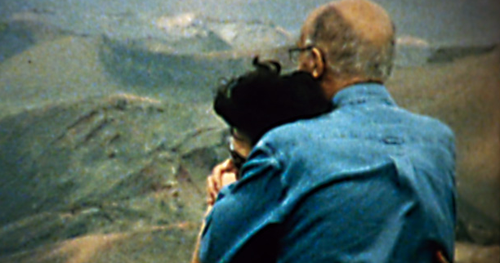José e Pilar (2010) again. This time at Vanderbilt's international movie series. There were about 30 people in the theatre. Before introducing the movie I asked how many people in the room had heard of Saramago before hearing about the movie. About half raised their hands. Then I asked how many had read anything by Saramago. Four hands remained in the air. I said "good! I hope I won't bore you too much with my brief introduction." And I got on with it...
José e Pilar (2010)
José Saramago was born
in 1922 in Azinhaga, some 60 miles northeast of Lisbon, that is, in rural
Portugal. His family was poor and he started working at a young age in manual
jobs while going to school at night. After completing high school he worked as
a clerk. His first novel dates from 1947. It was his most distinguished failure;
the publisher accepted it subject to a title change (from The Widow to Land of Sin)
fearing it wouldn’t sell… it remained unnoticed for years and Saramago put his
other writings on the shelf. For two decades he earned his living as a
translator, and as a journalist. In his fifties he started writing again and
was finally able to support himself as a full time writer by the late 1970s. In
1982, his fourth novel Baltasar and
Blimunda brought him international acclaim at age 60. Set in eighteenth
century Portugal, the story develops around the construction of a massive royal
palace built with the riches of empire. In a way that only he knew, Saramago
contrasted the lives of the masons who built the palace --afflicted by hardship
and affected by the inquisition-- and the lives of the royals who promised God a magnificent palace in return for an heir. [The latter is actually an
historical fact and the palace is real; you can visit it if you ever go to
Lisbon, it’s only 25 miles out]
Other historical and
non-historical novels followed, such as The
Stone Raft, The History of the Siege
of Lisbon, The Gospel According to
Jesus Christ, Blindness, All the Names. The list goes on. Just a
couple of words about two of them: The
Gospel According to Jesus Christ earned him a huge fight with the
Portuguese Church and state when the government ordered its removal from the
short list for the European literary prize in 1992… after this, Saramago moved
to the Spanish island of Lanzarote in the Canary islands, which we will see extensively
in the movie; Blindness was published
in Portuguese in 1995 and in English in 1997, shortly after Saramago was
awarded the Nobel Prize for Literature in 1998. It is the only book of his that has been adapted to film in 2008, featuring Julianne Moore and Mark
Ruffalo.
In 1986 Saramago met
the Spanish journalist Pilar del Río, 28 years his junior. She requested to
meet him after having read all his books published to that date. They married
in 1988 and Pilar became the official translator of his books into Spanish. The
movie tells us about the special bond between José and Pilar. The director of
the documentary, Miguel Gonçalves Mendes, followed the couple for about two
years, while they travelled the world for many talks and events associated with
Saramago’s books. At the same time Saramago was writing his second to last
novel The Elephant’s Journey, from
which we'll hear a little about in the movie.
I leave you with a few
of my thoughts about Saramago after attending a talk of his at NYU on October
26, of the year 2000. I wrote to a friend about it at the time, and I was able to recover
the email from which I now give you an excerpt. Note: a little of what you’ll hear
are my thoughts, a lot are his… I am sure you’ll have no trouble distinguishing
the two. Here it is:
I spent 45
minutes listening to a 78 year old man who doesn’t say anything spectacularly
new, but talks about his worries (“the problems that torment his thoughts” as
he says) in such a way that makes you look at reality differently.
At some
point he affirmed that “mankind lives in complete blindness... the same mankind
who wrote The Divine Comedy, committed
horrible atrocities in Auschwitz. Humans today spend millions in personal
hygiene products and yet they live in the dirtiest possible cities, without
even noticing the garbage when they get outside. We are the only rational being on earth, we say of
ourselves, and yet we are the only beings in this world capable of cruelty
against each other.”
“Our world is a show of infinite
cruelty”... "it’s easier to get to Mars with a machine that will study the
characteristics of the stones there, than to put an end to hunger in this planet. How is it possible to die of hunger in a world that produces more than enough
for all its inhabitants? One can die of cancer, of typhoid fever,
but of hunger? That’s the most undignified form
of death!".
He also spoke about his theory of the
creation of the universe: "it does not make sense that God created mankind
to put it in a remote and insignificant planet of a remote and insignificant
galaxy… that’s why I believe God created the universe for us. Initially we
inhabited the universe in its entirety... but when God realized the terrible
things we were doing he said ‘let me get rid of these people.’ He then placed us in
this tiny planet so we leave the rest of the universe clean and pure".
That’s it for now. Let me
know if you have any questions in the end. I hope you enjoy the movie.

Sem comentários:
Enviar um comentário